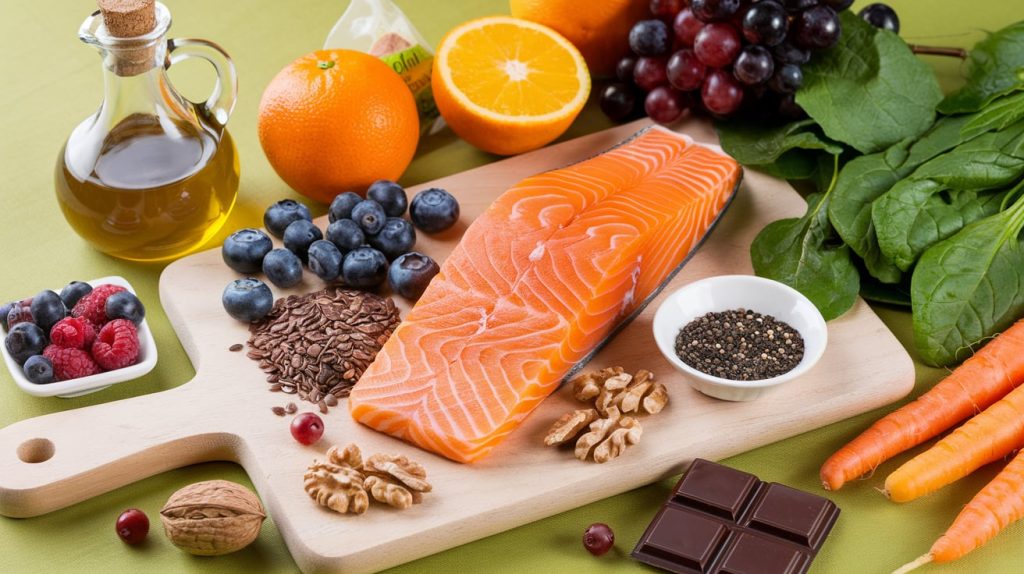
Chronic inflammation has been linked to various health issues such as heart disease, diabetes, arthritis, and even certain cancers. Thankfully, diet plays a significant role in fighting inflammation. In this guide, we’ll dive into key anti-inflammatory nutrients and show you how to incorporate them into your diet to reduce inflammation and improve overall health.
What is Inflammation?
Inflammation is your body’s natural immune response to infection, injury, or harmful stimuli. While acute inflammation is a short-term defense mechanism that helps your body heal, chronic inflammation can lead to long-term health problems. The good news is that by including the right foods in your diet, you can manage inflammation and support your body’s natural defenses.
1. Omega-3 Fatty Acids: A Powerful Anti-Inflammatory Ally
Omega-3 fatty acids are well-known for their potent anti-inflammatory properties. They help lower the production of inflammatory compounds, making them essential for heart health and joint pain relief.
- Sources of Omega-3s: Salmon, sardines, chia seeds, flaxseeds, walnuts.
Adding these foods rich in Omega-3 to your diet can help combat chronic inflammation, improve joint mobility, and protect your cardiovascular system.
2. Antioxidants: Defenders Against Free Radicals
Antioxidants neutralize free radicals, unstable molecules that can damage cells and trigger inflammation. Here are some key antioxidants to include in your diet:
- Vitamin C: Oranges, lemons, strawberries.
- Vitamin E: Almonds, sunflower seeds, broccoli.
- Beta-carotene: Carrots, sweet potatoes, pumpkin.
By increasing your intake of these antioxidants, you can reduce oxidative stress in your body, lowering the risk of chronic diseases linked to inflammation.
3. Polyphenols: Nature’s Anti-Inflammatory Powerhouses
Polyphenols are plant-based compounds with strong anti-inflammatory and antioxidant properties. They work by inhibiting inflammatory signaling pathways, improving cell health, and enhancing overall immunity.
- Sources of Polyphenols: Extra virgin olive oil, green tea, dark chocolate (70%+ cocoa), grapes.
Including these foods in your diet helps to protect your heart, reduce chronic inflammation, and improve metabolic function.
4. Fiber: The Gut-Inflammation Regulator
Dietary fiber not only aids digestion but also promotes the growth of beneficial bacteria in your gut, reducing gut inflammation. A healthy gut is key to controlling overall inflammation in the body.
- Sources of Fiber: Oats, quinoa, brown rice, beans, fruits, and vegetables.
Daily intake of sufficient dietary fiber helps balance gut microbiota, preventing the overgrowth of harmful bacteria and reducing inflammation.
5. Curcumin: Nature’s Anti-Inflammatory Wonder
Curcumin is the active compound found in turmeric and is recognized for its strong anti-inflammatory effects. It helps suppress the production of inflammatory molecules, making it particularly useful in managing conditions like arthritis and heart disease.
- Sources of Curcumin: Turmeric (combine with black pepper to boost absorption).
Incorporating turmeric into your meals, such as curries, soups, or smoothies, is a simple and effective way to enhance your body’s ability to fight inflammation.
6. Carotenoids: Natural Anti-Inflammatory Pigments
Carotenoids are potent antioxidants that give fruits and vegetables their bright colors while also fighting inflammation. Beta-carotene and lycopene, in particular, are known for supporting immune health and preventing chronic diseases.
- Sources of Carotenoids: Tomatoes, carrots, pumpkins, kale.
By eating a variety of colorful vegetables and fruits, you can protect your cells from free radical damage and reduce inflammation levels.
7. Sulfur Compounds: Immune-Boosting, Inflammation-Reducing Nutrients
Sulfur-containing compounds found in garlic, onions, and leeks have powerful anti-inflammatory, antibacterial, and antiviral properties. They help boost your immune system and reduce the risk of infections and inflammation.
- Sources of Sulfur Compounds: Garlic, onions, leeks.
Regular consumption of these foods can significantly enhance your body’s defenses against inflammation and infections.
8. Probiotics: Guardians of Gut Health
Probiotics are beneficial bacteria that help balance your gut microbiome and reduce systemic inflammation. A healthy gut microbiome is essential for preventing harmful bacteria from overgrowing and triggering inflammation.
- Sources of Probiotics: Yogurt, kefir, sauerkraut, kimchi.
By incorporating probiotic-rich foods into your diet, you can improve gut health and lower overall inflammation in your body.
Conclusion: Combat Inflammation with the Right Nutrients
By including anti-inflammatory nutrients in your daily meals, you can reduce inflammation and improve your overall well-being. Nutrients like Omega-3 fatty acids, antioxidants, polyphenols, fiber, and curcumin work together to prevent and manage chronic diseases while boosting your immune system.
Take Action Today: Start incorporating these anti-inflammatory foods into your diet and let them be your natural defense against chronic inflammation and disease!
